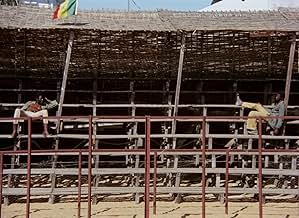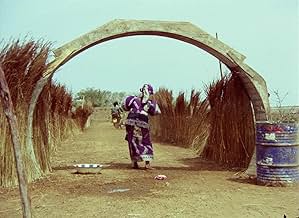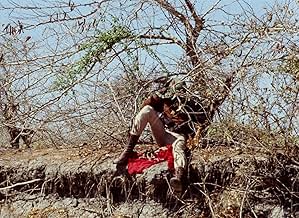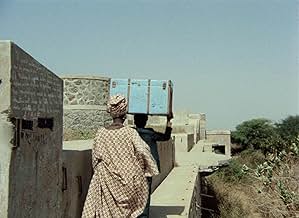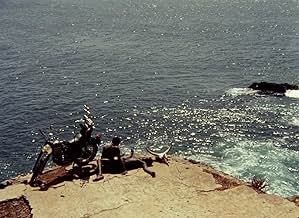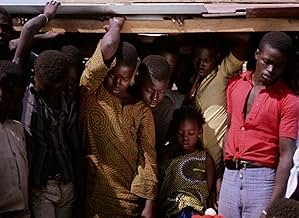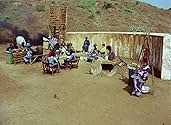IMDb RATING
7.0/10
4.3K
YOUR RATING
Mory, a cowherd, and Anta, a university student, try to make money in order to go to Paris and leave their boring past behind.Mory, a cowherd, and Anta, a university student, try to make money in order to go to Paris and leave their boring past behind.Mory, a cowherd, and Anta, a university student, try to make money in order to go to Paris and leave their boring past behind.
- Awards
- 2 wins & 1 nomination
Myriam Niang
- Anta
- (as Mareme Niang)
Josephine Baker
- Joséphine Baker
- (voice)
- (as Joséphine Baker)
- Director
- Writer
- All cast & crew
- Production, box office & more at IMDbPro
Storyline
Did you know
- TriviaThis film is believed to be Africa's first avant-garde film, although Oh, Sun (1970) could also make this claim.
- ConnectionsFeatured in Twenty Years of African Cinema (1983)
- SoundtracksParis, Paris, Paris
(Madrid) (uncredited)
Music by Agustín Lara
Spanish lyrics by Agustín Lara
French lyrics by Georges Tabet
Performed by Josephine Baker
Featured review
The story to this film is simple (maybe deceptively so), but it's told in an avant-garde way by Mambéty, and loaded with meaning. The premise is that a rebel and a university student have had enough of the traditional life in Dakar, and dream of escaping by ship to Paris. They get on his motorbike which is embellished with cow horns, and to the tune of Josephine Baker crooning "Paris, Paris," begin a series of misadventures on their way to the port.
The events that occur along the road trip, most involving theft or attempted theft, really aren't all that memorable, but the visuals that Mambéty and cinematographer Pap Samba Sow conjured up certainly were. Vibrant colors, rugged scenery, a photographer's eye for framing make for many gorgeous moments, pretty impressive for its limited budget. And yet, in stark contrast to the beauty in this land and its people, life is shown to be dirty, and a struggle. The film felt immersive into Senegal in a literal sense, but through its use of montages, fantasy, and misdirection, also immersive into the fractured mindset of its nonconformist protagonists.
Unfortunately, this immersion also includes some absolutely brutal scenes of animals being killed very early on - cattle in a slaughterhouse, as well as a goat out in a field. These go on for extended intervals, there is a lot of blood, and the animals are shown writhing in agony. Images from the slaughterhouse are reprised towards the end, giving it a larger point, that the young man is as trapped as those poor cows, which was a powerful moment, but I don't think the earlier scenes needed to have been as graphic as they were. It was nauseating to me, though admittedly my perspective is from a different culture, and one lucky enough to have the means to be vegetarian.
The film is made with artistry and style, but it's rooted in realism, and a reflection of the desire for a better life for the Senegalese. There isn't an overt argument made as to the devastating effects of colonialism that impoverished the country, but we do get a glimpse into the ugly attitudes of a French couple who have been teaching in Senegal for seven years, through this exchange:
"There's nothing to see in Senegal. Barren, intellectually as well." "Our salary is three times that of the Senegalese teachers, but they don't eat like we do. They're not as refined." "And what would we buy here? Masks? African art is a joke made up by journalists in need of copy."
Overall, despite its power and visual flair, I confess I admired this film more than I loved it. Aside from the animal slaughter (which may seriously turn you against the film on its own), the events on the road trip following that glorious scene on the flat rock with the sea churning below just weren't strong enough, and pacing was an issue. Worth seeing, just be prepared to avert your gaze in the beginning.
The events that occur along the road trip, most involving theft or attempted theft, really aren't all that memorable, but the visuals that Mambéty and cinematographer Pap Samba Sow conjured up certainly were. Vibrant colors, rugged scenery, a photographer's eye for framing make for many gorgeous moments, pretty impressive for its limited budget. And yet, in stark contrast to the beauty in this land and its people, life is shown to be dirty, and a struggle. The film felt immersive into Senegal in a literal sense, but through its use of montages, fantasy, and misdirection, also immersive into the fractured mindset of its nonconformist protagonists.
Unfortunately, this immersion also includes some absolutely brutal scenes of animals being killed very early on - cattle in a slaughterhouse, as well as a goat out in a field. These go on for extended intervals, there is a lot of blood, and the animals are shown writhing in agony. Images from the slaughterhouse are reprised towards the end, giving it a larger point, that the young man is as trapped as those poor cows, which was a powerful moment, but I don't think the earlier scenes needed to have been as graphic as they were. It was nauseating to me, though admittedly my perspective is from a different culture, and one lucky enough to have the means to be vegetarian.
The film is made with artistry and style, but it's rooted in realism, and a reflection of the desire for a better life for the Senegalese. There isn't an overt argument made as to the devastating effects of colonialism that impoverished the country, but we do get a glimpse into the ugly attitudes of a French couple who have been teaching in Senegal for seven years, through this exchange:
"There's nothing to see in Senegal. Barren, intellectually as well." "Our salary is three times that of the Senegalese teachers, but they don't eat like we do. They're not as refined." "And what would we buy here? Masks? African art is a joke made up by journalists in need of copy."
Overall, despite its power and visual flair, I confess I admired this film more than I loved it. Aside from the animal slaughter (which may seriously turn you against the film on its own), the events on the road trip following that glorious scene on the flat rock with the sea churning below just weren't strong enough, and pacing was an issue. Worth seeing, just be prepared to avert your gaze in the beginning.
- gbill-74877
- Mar 29, 2024
- Permalink
- How long is Touki Bouki?Powered by Alexa
Details
- Release date
- Country of origin
- Languages
- Also known as
- Journey of the Hyena
- Filming locations
- Production companies
- See more company credits at IMDbPro
Box office
- Gross worldwide
- $180
- Runtime1 hour 25 minutes
- Sound mix
- Aspect ratio
- 1.37 : 1
Contribute to this page
Suggest an edit or add missing content


